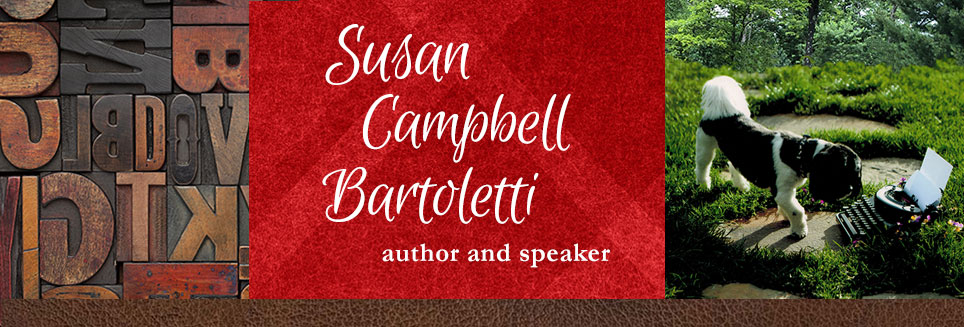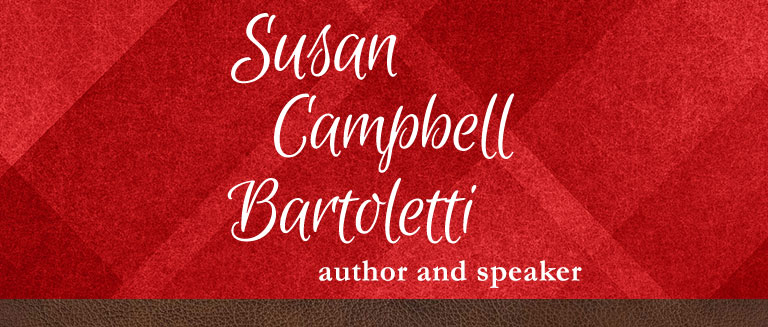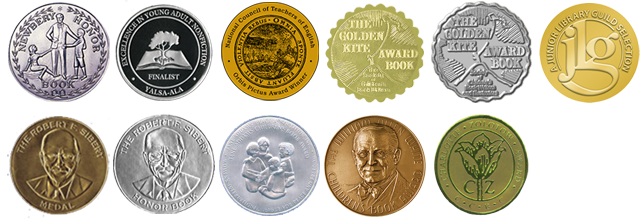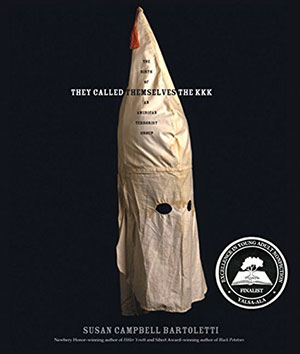They Called Themselves the KKK
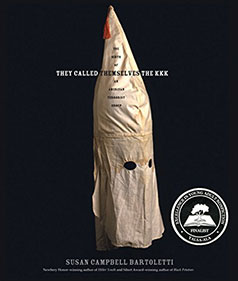
the KKK
by Susan Campbell Bartoletti
HMH Books for Young Readers, 2010
hardcover: 978-0618440337
paperback: 978-0544225824
176 pages, ages 11 up
Behind the Book
Part 2: Nationalists vs Universalists
The idea for this book began several years ago during a visit to Tennessee when I spotted a statue of Nathan Bedford Forrest.
At the time, I knew several things about the famous Confederate general: How the former slave trader and plantation owner enlisted in the Civil War as a private and rose to the rank of general. How his daring exploits earned him the reputation as a brilliant cavalryman who was both insubordinate and ruthless. How, under his command at Fort Pillow in Tennessee, Confederate soldiers committed one of the worst atrocities of the war. And how, after the war, he was later pardoned by President Andrew Johnson.
I also knew this: In 1867 the Confederate general reportedly became the first Grand Wizard of the Ku Klux Klan, a secret paramilitary organization that had formed in Tennessee one year earlier. The group was dedicated to the maintenance and restoration of white supremacy throughout the South.
Over the coming years, Ku Klux Klan dens sprang up throughout the South, brutally attacking defenseless freed men, women, and children and white people sympathetic to the freed people’s condition. Forrest was granted immunity for testifying during the great Ku Klux Klan trials of 1871-72.
That day, as I considered that statue, I found myself wondering about the thousands of victims of Klan violence and wondering: Where are their memorials?
With that question in mind, I called the Southern Poverty Law Center in Montgomery, Alabama, an organization internationally recognized for its tolerance education programs, its legal victories against white supremacists, and its tracking of hate groups.
I asked if anyone at the center could tell me if any statues commemorate the lives of the victims of Klan violence during the Reconstruction years. I was told there are none.
That’s the moment I decided to learn more about the reasons why tens of thousands of white men joined the Ku Klux Klan in the years that followed the Civil War.
As I researched, I was grabbed by the stories of ordinary white Americans who feared that they would suffer personal loss if the rights and privileges of citizenship were extended to the newly freed slaves and who feared black Americans would compete for land and for work.
I was grabbed by the stories of ordinary black Americans who wanted a simple justice and a fair chance to exercise their rights to vote, to make a living, to attend school, and to worship as they pleased — and were attacked by the KKK.
I was grabbed by the stories of white Americans who sympathized with the plight of the freedpeople — and were also attacked by the KKK.
Whenever I study history, I ask myself: why should I care about this subject today? Do I see any parallels today? In what ways is the past present in our lives — and our future?
Those questions drove me to attend the Klan Congress. I did not have to join the Klan in order to attend. I simply had to fill out a registration form and pay a small fee for the three-day event, which was open to “all white Christian nationalists.” According to the Klan, a “nationalist” is a person who believes America was founded by white people for white people. A “universalist” believes any member of any race can be an American and enjoy the rights and privileges of citizenship.
The Klansmen and women I met were very ordinary people who came from all walks of life. They claimed that their organization was not about hate, but about “love” and “love for their white heritage” and “love for their God and their country.” They said it’s not hate that they feel, but anger at what America has become. Some had traveled from far parts of the United States to attend, as far away as Alaska. For most, this was a family event, and some brought their children.
The Congress opened with a tour of the National Office, where I saw the membership room; the recruiting room; the souvenir room; the publishing room, where they print their pamphlets; and the media room, where the Klan leaders broadcast an internet television show and air shortwave radio programs.
That first night, the tone and theme were set for the weekend. The National Director called for a revival in America. A recruiter from Arkansas spoke, saying, among other things, that Protestant Christian churches have changed their message and have changed God. “God is a God of Segregation,” he said. “The God that made the races made them to stay separate.”
Throughout the weekend, other members spoke. Most of their speeches were variations of the same themes. Some told how the Klan gave meaning and direction to their life. Others spoke about the dangers of illegal immigrants, the number of nonwhites in America, homosexuality, Jews, Hollywood movies, television, public schools, and taxes. They claimed that America was founded by white people, for white people only.
On Saturday afternoon, I watched as men and boys wrapped a tall cross in kerosene-soaked rags and then covered it in burlap, and then carefully stood the cross on end. They were preparing for the Sunday’s closing cross-lighting ceremony. Stay tuned tomorrow for that ceremony — and a church service during which the National Director (who was also a pastor) called the work of the Klan a “holy mission.”
READ MORE:
Part 1: My Weekend with the KKK
Part 3: Children of the KKK
Part 4: A Silent Majority
